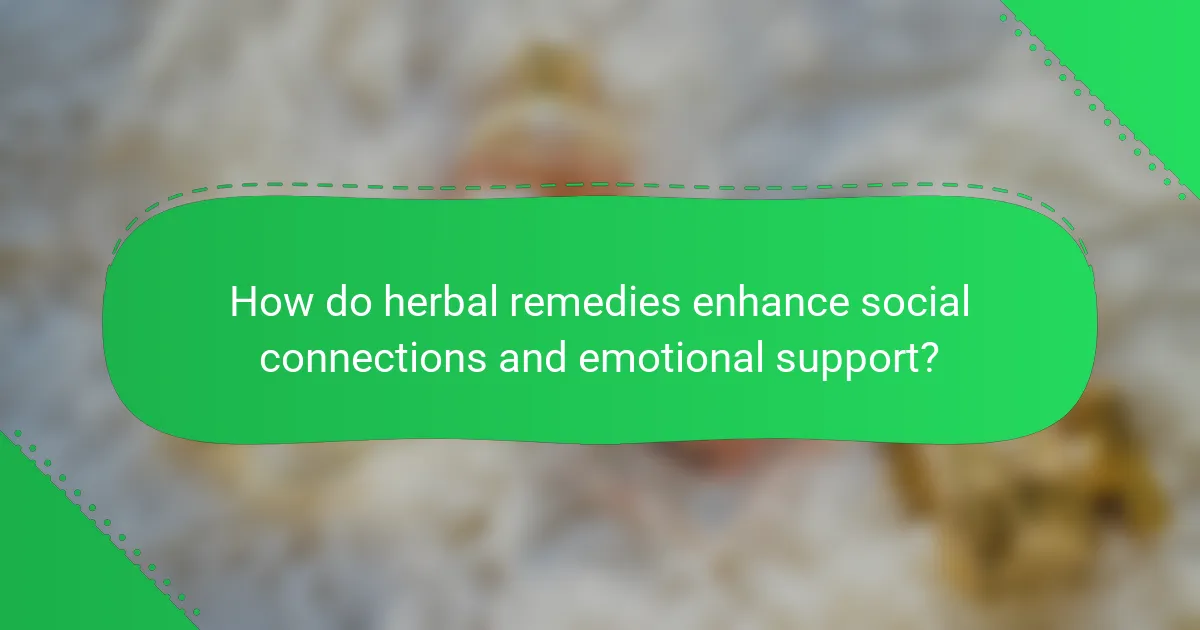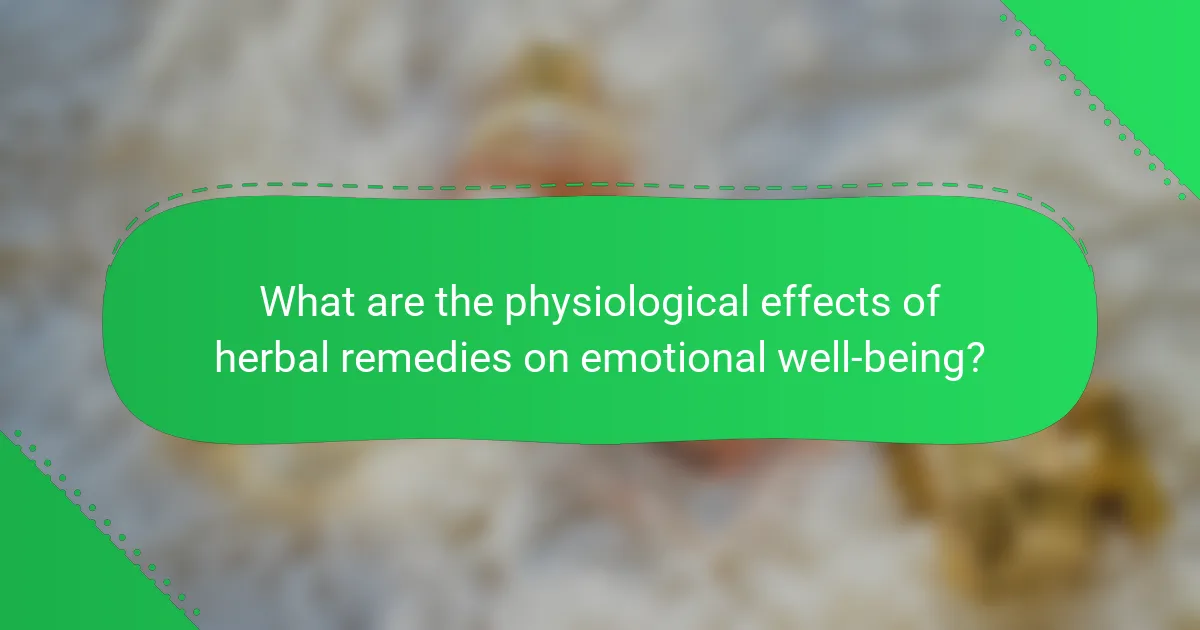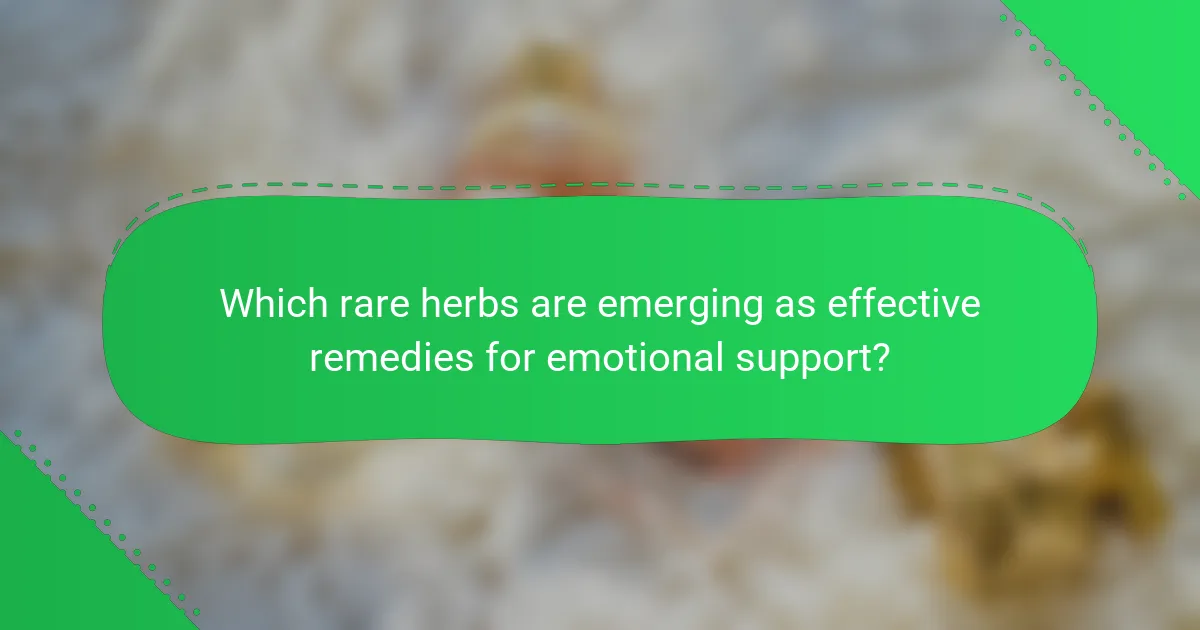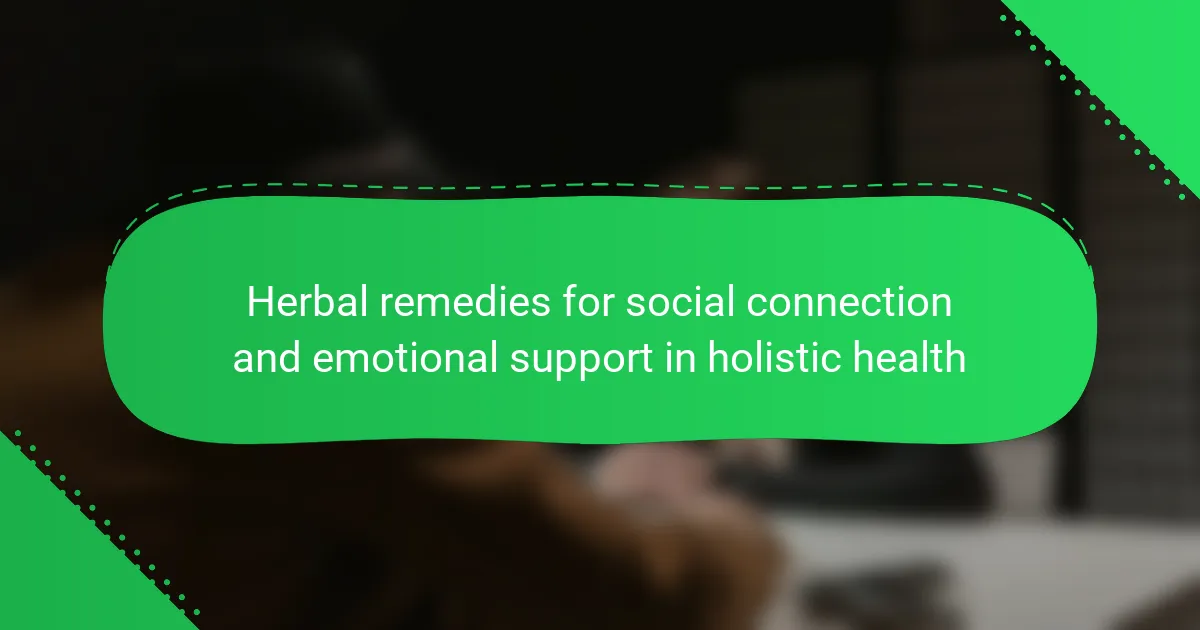Herbal remedies offer significant benefits for enhancing social connection and providing emotional support. These remedies promote relaxation and reduce anxiety, fostering open communication. Specific herbs like chamomile and ashwagandha improve mood and emotional resilience. Additionally, herbal teas create communal experiences that deepen social bonds, contributing to overall mental well-being.

How do herbal remedies enhance social connections and emotional support?
Herbal remedies enhance social connections and emotional support by promoting relaxation and reducing anxiety. These remedies, such as chamomile and valerian root, can foster a sense of calm, encouraging open communication and deeper relationships. Additionally, certain herbs like ashwagandha may improve mood, enhancing emotional resilience during social interactions. The holistic approach of herbal remedies supports overall well-being, making individuals more receptive to social engagements.
What are the key herbal remedies known for their social and emotional benefits?
Herbal remedies known for their social and emotional benefits include ashwagandha, chamomile, and St. John’s Wort. These herbs support emotional well-being and foster social connections through their calming and uplifting properties. Ashwagandha reduces stress and anxiety, promoting a sense of calm. Chamomile is known for its soothing effects, helping to alleviate feelings of tension. St. John’s Wort has been linked to improved mood and emotional stability, enhancing social interactions. Incorporating these herbal remedies can contribute to holistic health and emotional support.
Why do certain herbs foster community and connection?
Certain herbs foster community and connection by promoting emotional well-being and social bonding. Herbal remedies like chamomile, lavender, and ashwagandha enhance relaxation and reduce anxiety, creating a conducive environment for social interactions. These herbs often serve as focal points in gatherings, encouraging shared experiences and conversations. Additionally, their natural properties can enhance feelings of empathy and understanding among individuals, strengthening community ties.
How do cultural perceptions influence the use of herbal remedies for emotional support?
Cultural perceptions significantly shape the use of herbal remedies for emotional support. These perceptions influence beliefs about efficacy, safety, and appropriateness, impacting individual choices and community practices.
In many cultures, herbal remedies are viewed as natural and holistic, promoting social connection through shared traditions and knowledge. For example, in traditional Chinese medicine, herbs like ginseng are valued not only for their benefits but also for their role in community bonding.
Conversely, in cultures with a strong reliance on pharmaceutical solutions, herbal remedies may be seen as less credible or effective. This can lead to a disconnect between individuals seeking emotional support and the available herbal options.
Ultimately, cultural narratives and values dictate how people perceive and utilize herbal remedies, affecting their integration into holistic health practices.

What are the physiological effects of herbal remedies on emotional well-being?
Herbal remedies positively influence emotional well-being by enhancing social connection and providing emotional support. Chamomile and lavender, for example, reduce anxiety and promote relaxation. These remedies contain compounds that interact with neurotransmitters, supporting mood regulation. Additionally, certain herbal teas foster communal experiences, deepening social bonds. The unique attribute of adaptogens, like ashwagandha, helps the body manage stress, contributing to emotional resilience. Regular use of these remedies can lead to improved overall mental health and social interactions.
Which compounds in herbs contribute to emotional stability?
Herbs contain various compounds that contribute to emotional stability. Key compounds include flavonoids, terpenes, and alkaloids, which interact with neurotransmitters to enhance mood and reduce anxiety. For example, chamomile contains apigenin, promoting relaxation, while ashwagandha’s withanolides help manage stress. These compounds support holistic health by fostering social connection and emotional well-being.
How do herbal remedies affect neurotransmitter levels?
Herbal remedies can positively influence neurotransmitter levels, enhancing social connection and emotional support. For example, St. John’s Wort may increase serotonin levels, improving mood and fostering social interactions. Similarly, ashwagandha can reduce cortisol, promoting emotional balance. These effects contribute to holistic health by supporting mental well-being and interpersonal relationships.

What role do herbal remedies play in holistic health practices?
Herbal remedies significantly enhance social connection and emotional support in holistic health practices. They foster community bonds through shared experiences and rituals, promoting mental well-being. For instance, herbal teas often serve as a medium for social gatherings, encouraging conversation and connection. Additionally, specific herbs like chamomile and lavender are known for their calming effects, which can reduce anxiety and improve mood. This emotional support is vital in holistic health, addressing not just physical ailments but also psychological and social aspects of well-being.
How can herbal remedies complement traditional therapy for emotional support?
Herbal remedies can effectively complement traditional therapy by enhancing emotional support and promoting social connection. These remedies, such as St. John’s Wort and chamomile, may reduce anxiety and improve mood. Research indicates that integrating herbal treatments with therapy can lead to better emotional outcomes. Additionally, herbs can foster a sense of community when shared in group settings, reinforcing social bonds.
Which holistic practices integrate herbal remedies for social connection?
Herbal remedies that promote social connection and emotional support include chamomile, lavender, and ashwagandha. These herbs foster relaxation, reduce anxiety, and enhance mood, facilitating social interactions. Chamomile is known for its calming effects, while lavender offers a soothing aroma that encourages openness. Ashwagandha, an adaptogen, helps manage stress, allowing for improved emotional resilience. Incorporating these remedies into holistic practices can enrich social bonds and emotional well-being.

What are the unique attributes of specific herbal remedies used globally?
Unique attributes of herbal remedies for social connection and emotional support include their cultural significance, specific emotional benefits, and traditional preparation methods. For instance, chamomile promotes relaxation and social bonding, while lavender is known for its calming effects. These remedies often vary by region, showcasing unique preparation techniques that enhance their efficacy in fostering emotional support.
How does the use of Ashwagandha differ across cultures in addressing social anxiety?
The use of Ashwagandha varies across cultures in its approach to social anxiety. In Ayurvedic practices, it is viewed as a calming adaptogen that balances the mind and body, promoting emotional stability. Western herbalism often emphasizes its stress-relieving properties, highlighting its effects on cortisol levels and overall mental health.
In India, Ashwagandha is commonly consumed in powder form mixed with milk or honey, aiming for holistic wellness. In contrast, Western cultures may prefer capsules or extracts for convenience.
Research indicates that Ashwagandha can reduce anxiety symptoms effectively, with studies showing a 28% decrease in stress levels among users. This highlights its potential as a unifying remedy across diverse cultural practices, fostering social connection through improved emotional support.
What unique benefits does Kava offer in fostering social interactions?
Kava uniquely enhances social interactions by promoting relaxation and reducing anxiety. This herbal remedy fosters a sense of community and connection, making social gatherings more enjoyable. Kava’s active compounds, called kavalactones, contribute to its calming effects, which can lead to improved communication and bonding among individuals. As a result, Kava serves as a valuable tool in holistic health for nurturing emotional support and social cohesion.

Which rare herbs are emerging as effective remedies for emotional support?
Some rare herbs emerging as effective remedies for emotional support include Rhodiola rosea, Ashwagandha, and St. John’s Wort. Rhodiola rosea is known for reducing stress and fatigue. Ashwagandha helps with anxiety and mood stabilization. St. John’s Wort is recognized for alleviating symptoms of depression. These herbs enhance social connection and emotional well-being in holistic health practices.
What is the significance of rare herbs like St. John’s Wort in modern herbalism?
Rare herbs like St. John’s Wort play a significant role in modern herbalism by providing emotional support and enhancing social connections. This herb is known for its unique ability to alleviate symptoms of depression and anxiety, promoting overall mental well-being. As a natural remedy, it offers a holistic approach to emotional health, allowing individuals to connect more deeply with themselves and others. The use of St. John’s Wort in herbal practices reflects a growing trend towards integrating traditional remedies into contemporary wellness strategies. Its efficacy in fostering emotional resilience positions it as a valuable tool in holistic health.
How are lesser-known herbs being researched for their emotional benefits?
Lesser-known herbs are being researched for their emotional benefits through studies on their effects on mood and social connection. These herbs, such as ashwagandha and rhodiola, show promise in reducing anxiety and enhancing emotional resilience. Research highlights their potential to support mental well-being by influencing neurotransmitter activity and stress response. For instance, ashwagandha has demonstrated a 30% reduction in stress levels in clinical trials. This growing interest reflects a shift towards holistic health, emphasizing natural remedies for emotional support.

What are the best practices for using herbal remedies safely?
To use herbal remedies safely for social connection and emotional support, follow these best practices. First, consult a healthcare professional before starting any new herbal regimen. Ensure the herbs you choose are suitable for your specific emotional needs and health conditions. Start with small doses to assess your body’s response and gradually increase if necessary. Keep a journal to track your experiences and any side effects. Choose high-quality herbs from reputable sources to avoid contaminants. Lastly, be aware of potential interactions with medications or other supplements.
How can individuals identify the right herbal remedy for their needs?
Individuals can identify the right herbal remedy by assessing their specific emotional needs and social contexts. Start by recognizing the feelings or situations prompting the need for support. Research herbal remedies known for emotional balance, such as chamomile for calming or St. John’s Wort for mood enhancement. Consult with a knowledgeable herbalist or healthcare provider to ensure safe and effective use. Consider personal preferences and any potential allergies when selecting a remedy.
What common mistakes should be avoided when using herbal remedies for emotional support?
Avoiding common mistakes when using herbal remedies for emotional support is crucial for effectiveness. First, do not self-diagnose; always consult a healthcare professional for tailored advice. Second, avoid mixing herbal remedies without guidance, as interactions can diminish benefits. Third, do not ignore dosage recommendations; overuse can lead to adverse effects. Lastly, be cautious of relying solely on herbal remedies without integrating other holistic practices, such as mindfulness or therapy, for comprehensive emotional support.
Which expert tips can enhance the effectiveness of herbal remedies in social contexts?
Utilizing expert tips can significantly enhance the effectiveness of herbal remedies for social connection and emotional support. Focus on the following strategies:
1. Choose herbs known for their calming effects, such as chamomile or lavender, to foster a relaxed atmosphere.
2. Prepare herbal teas in group settings, promoting sharing and bonding through the communal experience.
3. Incorporate storytelling about the origins and benefits of the herbs, enriching the social interaction and emotional connection.
4. Encourage participants to share personal experiences related to the herbs, creating a supportive environment for emotional expression.
